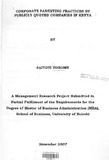| dc.description.abstract | The key question for multi-busines is not which businesses to be in,
how to structure them, or what size they should be but rather how the
parent can create a strategy which will add value to the constituent
businesses. Questions have emerged on: What is the strategic rationale
of the corporate parent? What is it there for? What is its valuable role?
The real issue is not whether a business unit should have a parent or be
independent, but which parent is most appropriate and what corporate
strategy it has such that it can support the businesses it manages by
enhancing value created at business unit level. This, according to Goold
et al (1994) is essentially what entails a good corporate parenting
practice.
Despite the importance of the -Concept of corporate parenting in
managing multi-business companies, there has been no empirical study
done on practice among the group companies in Kenya. This study
sought to determine corporate parenting practices in group companies
listed in the Nairobi Stock Exchange (NSE) and how they support their
business units. In order to determine this, a census study was done. The
population of interest was all the twelve quoted group companies in the
NSE and their twenty seven subsidiary companies which are
incorporated in Kenya and were active and trading as at 30th June 2007.
Two separate questionnaires with open ended and close ended questions
were used to collect data from the parent companies and their
subsidiaries. For the purpose of showing the relationship among various
variables, quantitative analysis was done on the data collected using
descriptive statistics such as percentages, bar charts, pie charts and
tables to describe the distributions.
From the study, it was established that out of twelve group companies
listed in the NSE, seven of them, representing fifty eight percent
practiced some aspects of corporate parenting to a great extent. However,
the level of practice differed in many aspects. The study also revealed
that even though the parent companies exercised a high degree of control
over their subsidiary companies, most of them were satisfied with the
support they received from them anp. considered it adequate.
The fact that the response rate was not one hundred percent and that
the study was a census survey concentrating only on group companies
quoted in the NSE can be regarded as some of the limitations of the
study.
(vi)
It is therefore recommended that a similar study should be carried out
on non-quoted group companies to determine how corporate parenting is
practiced and how they support the business units they manage.
Corporate parenting practices could be studied in the context a case
study whereby some of the largest and well established conglomerates in
Kenya could be researched so to establish the strategic interaction
between parent company and business units it controls. | en |

